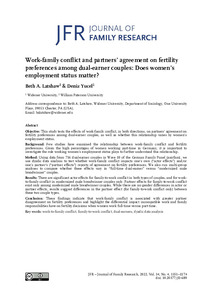Please use this identifier to cite or link to this item:
http://hdl.handle.net/20.500.12164/3303Full metadata record
| DC Field | Value | Language |
|---|---|---|
| dc.contributor.author | Latshaw, Beth A. | - |
| dc.contributor.author | Yucel, Deniz | - |
| dc.date.accessioned | 2023-03-10T20:34:26Z | - |
| dc.date.available | 2023-03-10T20:34:26Z | - |
| dc.date.issued | 2022-01-31 | - |
| dc.identifier.citation | Latshaw, B. A., & Yucel, D. (2022). Work-family conflict and partners' agreement on fertility preferences among dual-earner couples: Does women's employment status matter?. Journal of Family Research, 34(4), 1151-1174. | en_US |
| dc.identifier.issn | 2699-2337 | - |
| dc.identifier.uri | http://hdl.handle.net/20.500.12164/3303 | - |
| dc.description.abstract | Objective: This study tests the effects of work-family conflict, in both directions, on partners’ agreement on fertility preferences among dual-earner couples, as well as whether this relationship varies by women’s employment status. Background: Few studies have examined the relationship between work-family conflict and fertility preferences. Given the high percentages of women working part-time in Germany, it is important to investigate the role working women’s employment status plays to further understand this relationship. Method: Using data from 716 dual-earner couples in Wave 10 of the German Family Panel (pairfam), we use dyadic data analysis to test whether work-family conflict impacts one’s own (“actor effects”) and/or one’s partner’s (“partner effects”) reports of agreement on fertility preferences. We also run multi-group analyses to compare whether these effects vary in “full-time dual-earner” versus “modernized male breadwinner” couples. Results: There are significant actor effects for family-to-work conflict in both types of couples, and for work-to-family conflict in modernized male breadwinner couples only. Partner effects for family-to-work conflict exist only among modernized male breadwinner couples. While there are no gender differences in actor or partner effects, results suggest differences in the partner effect (for family-to-work conflict only) between these two couple types. Conclusion: These findings indicate that work-family conflict is associated with greater partner disagreement on fertility preferences and highlight the differential impact incompatible | en_US |
| dc.language.iso | en_US | en_US |
| dc.publisher | Journal of Family Research | en_US |
| dc.rights | Attribution-NonCommercial-NoDerivs 3.0 United States | * |
| dc.rights.uri | http://creativecommons.org/licenses/by-nc-nd/3.0/us/ | * |
| dc.subject | work-to-family conflict | en_US |
| dc.subject | family-to-work conflict | en_US |
| dc.subject | dual-earners | en_US |
| dc.subject | dyadic data analysis | en_US |
| dc.subject.lcsh | Sociology | en_US |
| dc.title | Work-family conflict and partners’ agreement on fertility preferences among dual-earner couples: Does women’s employment status matter? | en_US |
| dc.type | Article | en_US |
| Appears in Collections: | Sociology | |
Files in This Item:
| File | Description | Size | Format | |
|---|---|---|---|---|
| Latshaw-Yucel2022.pdf | 597.97 kB | Adobe PDF |  View/Open |
This item is licensed under a Creative Commons License

